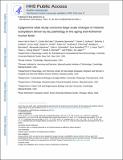Epigenome-wide study uncovers large-scale changes in histone acetylation driven by tau pathology in aging and Alzheimer’s human brains
Author(s)
Klein, Hans-Ulrich; McCabe, Cristin; Gjoneska, Elizabeta; Sullivan, Sarah E; Kaskow, Belinda J; Tang, Anna; Smith, Robert V; Xu, Jishu; Pfenning, Andreas R; Bernstein, Bradley E; Meissner, Alexander; Schneider, Julie A; Mostafavi, Sara; Tsai, Li-Huei; Young-Pearse, Tracy L; Bennett, David A; De Jager, Philip L; ... Show more Show less
DownloadAccepted version (951.0Kb)
Publisher Policy
Publisher Policy
Article is made available in accordance with the publisher's policy and may be subject to US copyright law. Please refer to the publisher's site for terms of use.
Terms of use
Metadata
Show full item recordAbstract
© 2018, The Author(s), under exclusive licence to Springer Nature America, Inc. Accumulation of tau and amyloid-β are two pathologic hallmarks of Alzheimer’s disease. We conducted an epigenome-wide association study using the histone 3 lysine 9 acetylation (H3K9ac) mark in 669 aged human prefrontal cortices; in contrast with amyloid-β, tau protein burden had a broad effect on the epigenome, affecting 5,990 of 26,384 H3K9ac domains. Tau-related alterations aggregated in large genomic segments reflecting spatial chromatin organization, and the magnitude of these effects correlated with the segment’s nuclear lamina association. Functional relevance of these chromatin changes was demonstrated by (1) consistent transcriptional changes in three independent datasets and (2) similar findings in two mouse models of Alzheimer’s disease. Finally, we found that tau overexpression in induced pluripotent stem cell-derived neurons altered chromatin structure and that these effects could be blocked by a small molecule predicted to reverse the tau effect. Thus, we report broad tau-driven chromatin rearrangements in the aging human brain that may be reversible with heat-shock protein 90 (Hsp90) inhibitors.
Date issued
2019Department
Picower Institute for Learning and MemoryJournal
Nature Neuroscience
Publisher
Springer Nature
Citation
Klein, Hans-Ulrich, McCabe, Cristin, Gjoneska, Elizabeta, Sullivan, Sarah E, Kaskow, Belinda J et al. 2019. "Epigenome-wide study uncovers large-scale changes in histone acetylation driven by tau pathology in aging and Alzheimer’s human brains." Nature Neuroscience, 22 (1).
Version: Author's final manuscript